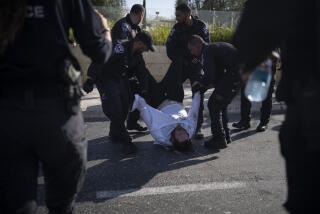Sharon Hits Snag in Effort to Form New Government
- Share via
JERUSALEM — Israeli Prime Minister Ariel Sharon’s plan to quickly assemble a new government was in doubt Monday as he waited to learn whether a small religious party would provide a crucial piece of the proposed coalition.
Sharon’s aides said the prime minister might be forced to call early elections, possibly upsetting plans for a pullout from the Gaza Strip this summer, if United Torah Judaism did not join his coalition. Sharon has already recruited the left-leaning Labor Party and hopes to present his new governing alliance early this week.
Labor’s partnership with Sharon’s Likud Party gives him a narrow majority in the 120-member Knesset, or parliament. But he wants to add at least one of two Orthodox religious parties to mollify members of his party’s right wing for the addition of Labor, and to provide a cushion in case some Likud members abandon him over opposition to the planned Gaza withdrawal.
Sharon’s tenuous hold was highlighted Monday when three no-confidence motions gained pluralities in the Knesset. However, the motions fell short of the majorities needed to topple the government.
United Torah Judaism holds five seats in the Knesset; a second Orthodox party, Shas, has 11.
Sharon’s bid to enlist United Torah Judaism appeared to be meeting unexpected resistance. The decision on whether to join rested with a group of elder rabbis who are the party’s spiritual leaders.
In an interview with New York Times columnist William Safire published Monday, Sharon said elections would be a “major mistake” for Israel.
But the prime minister said he was determined to go ahead with the withdrawal. Under the plan, Israel would remove Jewish settlers and soldiers from the Gaza Strip and a tiny slice of the West Bank.
Calling elections would probably delay the pullout, perhaps for months, and could even kill the plan.
Sharon said rebellious Likud members and “radical rabbis” who opposed the withdrawal had sought to undermine a coalition deal with an ultra-Orthodox party, apparently referring to United Torah Judaism.
On Monday, Sharon said he might turn to Shas, which has opposed the withdrawal because it would be a unilateral move by Israel rather than the result of an agreement with the Palestinians. Sharon has said he would coordinate the evacuation with the Palestinians if a moderate leadership emerged from Sunday’s election for president of the Palestinian Authority.
Labor agreed last week to join Sharon’s government -- an alliance the prime minister said he needed to avoid collapse after he fired the remaining coalition partner last month in a dispute over the 2005 budget.
Labor opposes many of Sharon’s policies but wants to make sure that the withdrawal of all 21 settlements in Gaza and four in the West Bank is carried out.
The evacuation is fiercely opposed by settlers and their political allies, who on Monday launched a sit-in next to the Knesset building in protest. Demonstrators plan to sleep in tents there during coming weeks.
Israeli officials voiced concern over warnings by settler leaders -- who have called for civil disobedience to block the withdrawal -- that large numbers of soldiers might refuse orders to empty the settlements.
“If this is the picture, then it will be very difficult, so much so that it may be impossible to carry out, God forbid, in the sense of the army’s ability to function as the branch that carries out the orders of the political echelon,” Zeev Boim, the deputy defense minister, told Israel Radio.
The army’s chief of staff, Lt. Gen. Moshe Yaalon, held a tense meeting Sunday night during which settler leaders said thousands of soldiers might refuse to carry out evacuation orders. Yaalon said widespread insubordination was “liable to lead to disintegration and ruin,” the newspaper Yediot Aharonot reported.
One soldier who lives at the West Bank settlement of Yitzhar, near Nablus, was arrested Monday for urging fellow troops to disobey orders, according to news reports.
Settlers near Yitzhar clashed with Israeli soldiers sent to remove two trailers from an unauthorized outpost. Israeli media reported that 15 people were arrested as settlers pelted soldiers with rocks and called them Nazis.
Israel has promised to remove outposts built since March 2001. The informal offshoots of settlements often consist of little more than a trailer and water tower.
More to Read
Sign up for Essential California
The most important California stories and recommendations in your inbox every morning.
You may occasionally receive promotional content from the Los Angeles Times.













